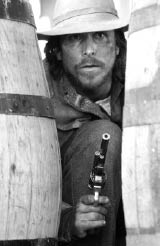Who Will Punch His Ticket?: 3:10 to Yuma
by George Sax

A guy I know asked me the other day what movie I was reviewing this week. When I told him it was a Western he said: “I didn’t know they still made those.”
It’s an understandable response. The Western, arguably the most influential and popular movie genre during the first half-century or so of American film history, has barely been in evidence over the last three decades. Once, the mythologized story of frontier life and the conquering tide of white settlement in the western half of the country was an influential part of American ideology and the image of this country overseas. That image has lost a lot of its force, post-Vietnam.
The high-water mark for Westerns was probably in the 1950s, when movies and television churned out hundreds each year, though even then there were mild signs of decay and declining confidence in the form. In 1955 crime novelist Elmore Leonard, then turning out Western fiction for the pulp market, wrote his short story “3:10 to Yuma.” Two years later, in 1957, Delmer Daves directed a screen version, with Glenn Ford and Van Heflin in the leads.
Now, 50 years on, James Mangold has remade it. Other than Hollywood’s inveterate recycling of old material, there doesn’t seem to be any obvious reason for this recreation, and it’s unlikely Mangold’s movie will do anything appreciable to revive interest in Westerns.
Leonard’s story and Daves’ movie portrayed the lonely, frightening ordeal of a down-on-his-luck homesteader (Heflin) who agrees to bring a captured notorious Arizona bandit (Ford) to the train that will carry the outlaw to the territorial pen when no one else in town will accept the job, even for the large amount of cash the railroad is offering. Outside the hotel room, where the two are holed up, the outlaw’s gang waits, the reason no one else will volunteer.
Daves’ movie was really a pas de deux between the devilish, facilely charming gang leader and the stolid, anxious guard trying to resist his prisoner’s Faustian offers.
Mangold and company have blown up this simple, tight little story, greatly expanding the cast of characters and sending most of them on an odyssey of sorts, bringing the gang leader (Russell Crowe) to a train depot in another distant town. The hard-luck little rancher (Christian Bale) is now only one of a small number of ad hoc lawmen, and the relationship and psychological duel between the two main characters is less focal.
It might have been possible to make this scenario work, and there are bits and sequences that do, but for the most part, Mangold hasn’t just enlarged the story, he’s inflated it, adding considerable violence and brutality to help fill in the expansion.
As his picture moves toward its ostensibly tense resolution, it acquires some of the style of two other pop forms. The climactic action sequence illustrates the growing influence of video games on movie-making. It’s filmed and cut like something that was made for the manipulations of a gamer’s remote control. At the same time, it plays out like the fantastic panels of a comic book. This blunt-edged vulgarity is at odds with the movie’s pretensions to become a pop moral saga.
More subtly, this 3:10 often feels off the mark because of the casting of the two leads, particularly in the case of Crowe. He’s an impressive film actor, but his effectiveness usually comes from his intensity, even when he’s dampening it. Here, in a role that requires slyness and a (literally) lethal charm, he seems a little lethargic and inhibited.
Surprisingly, Bale comes off okay as the nobly embattled and reluctant deputy, though things might have worked better if the casting had been reversed. But the movie would still have been saddled with its ungainly excesses, and the final scene is emblematic of Mangold’s approach. The conclusion tries to be both melodramatically extravagant and cynical. It’s an untenable posture.
|
Issue Navigation> Issue Index > v6n36: Curtain Up! (9/6/07) > Film Reviews > Who Will Punch His Ticket?: 3:10 to Yuma This Week's Issue • Artvoice Daily • Artvoice TV • Events Calendar • Classifieds |









 Current Issue
Current Issue